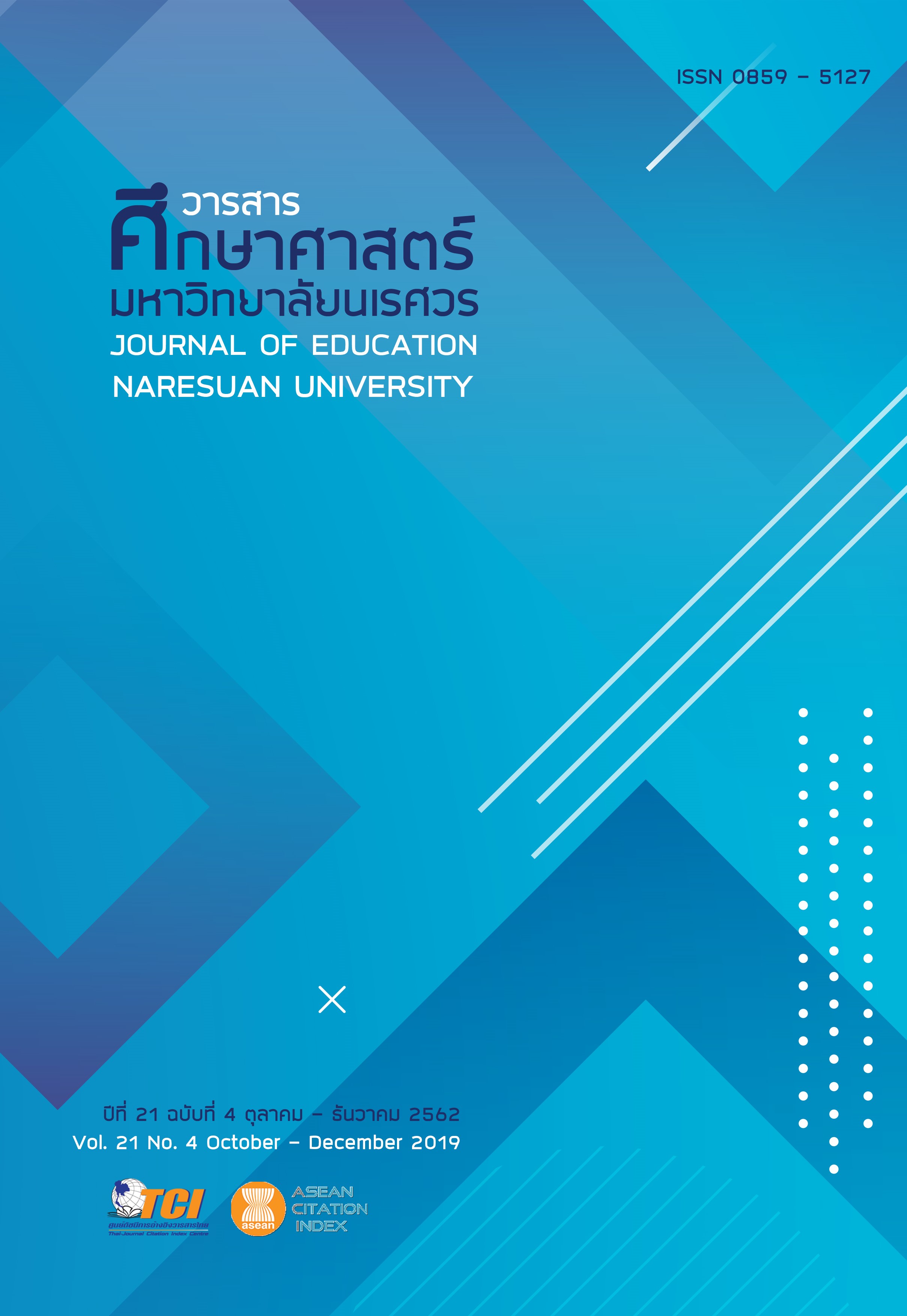รูปแบบการบริหารเพื่อส่งเสริมอาชีพของนักเรียนในโรงเรียนขยายโอกาสที่ตั้งอยู่บนพื้นที่สูงและทุรกันดารในเขตภาคเหนือด้านตะวันตก (AN ADMINISTRATIVE MODEL TO PROMOTE CAREERS FOR STUDENTS IN THE OPPORTUNITY EXPANSION SCHOOLS LOCATED ON HIGHLAND AND REMOTE AREAS IN NORTHWEST PROVINCES)
Main Article Content
Abstract
การวิจัยนี้มีวัตถุประสงค์เพื่อ 1) ศึกษาสภาพบริบทพื้นที่สูงและทุรกันดาร ความต้องการจำเป็นเรื่องอาชีพ และแนวทางการจัดการศึกษาเพื่อส่งเสริมอาชีพของนักเรียนในโรงเรียนขยายโอกาสที่ตั้งอยู่บนพื้นที่สูงและทุรกันดารในเขตภาคเหนือด้านตะวันตก 2) เสนอรูปแบบการบริหารเพื่อส่งเสริมอาชีพของนักเรียน และ 3) ประเมินรูปแบบการบริหารเพื่อส่งเสริมอาชีพของนักเรียนวิธีดำเนินการวิจัยโดยการเก็บข้อมูลจากการสัมภาษณ์ กลุ่มตัวอย่างจากผู้มีส่วนเกี่ยวข้องกับโรงเรียนขยายโอกาสที่ตั้งอยู่บนพื้นที่สูงและทุรกันดาร ได้แก่ ผู้บริหารโรงเรียน ครูผู้รับผิดชอบงานวิชาการ ครูผู้สอนกลุ่มสาระการเรียนรู้การงานพื้นฐานอาชีพและเทคโนโลยี ผู้ปกครองนักเรียน ผู้นำชุมชน และนักเรียน การศึกษาแบบพหุศึกษา โรงเรียนที่มีแนวปฏิบัติที่ดีที่ตั้งอยู่บนพื้นที่สูงและทุรกันดาร จำนวน 3 แห่ง การประชุมกลุ่มผู้เชี่ยวชาญ การใช้แบบสอบถาม เพื่อประเมินความเป็นไปได้และความเป็นประโยชน์ของรูปแบบการบริหารที่เสนอ ผลการวิจัย พบว่า 1) สภาพบริบทของพื้นที่สูงและทุรกันดาร เพื่อการพัฒนาที่ยั่งยืน ประกอบด้วย ด้านบริบททางสังคม ด้านเศรษฐกิจ และด้านสิ่งแวดล้อม ความต้องการจำเป็นของอาชีพ คือ อาชีพด้านเกษตรกรรม อุตสาหกรรม งานคหกรรม งานสร้างสรรค์ งานบริการ และงานด้านการตลาด แนวทางการส่งเสริมอาชีพ ประกอบด้วย หลักการส่งเสริม วิธีการส่งเสริม และการบริหารแบบมีส่วนร่วม 2) รูปแบบการบริหารเพื่อส่งเสริมอาชีพของนักเรียนในโรงเรียนขยายโอกาสที่ตั้งอยู่บนพื้นที่สูงและทุรกันดาร ในเขตภาคเหนือด้านตะวันตก ประกอบด้วย หลักการส่งเสริมอาชีพทั่วไปในชุมชน หลักการส่งเสริมอาชีพของนักเรียน การบริหารแบบมีส่วนร่วม และการกำหนดเป้าหมายการส่งเสริมอาชีพ 3) ผลการประเมินรูปแบบการบริหารที่นำเสนอมีความเป็นไปได้และเป็นประโยชน์ในการนำไปใช้อยู่ในระดับมาก
AN ADMINISTRATIVE MODEL TO PROMOTE CAREERS FOR STUDENTS IN THE OPPORTUNITY EXPANSION SCHOOLS LOCATED ON HIGHLAND AND REMOTE AREAS IN NORTHWEST PROVINCES
This research study aimed to1) study the fundamental contexts of the highland and remote areas in Northwest provinces, 2) draft an administrative model to promote careers for students in the opportunity expansion schools locating on highland and remote areas in Northwest provinces, and 3) evaluate the proposed administrative model for implementation in schools.The research methodology was conducted by the interviews with the selected samples of school stake-holders as the school administrators, the academic in charge teachers, the teachers who teach career and technology subjects, parents, community leaders and students. The multi-case studies of 3 best practiced school were included in data collecting. The focus group discussion of educational experts was used to check and correct the proposed administrative model and the questionnaire was used to evaluated proposed model. The results of the research revealed that; 1) the fundamental contexts of the highland and remote areas in the Northwest provinces should be directed to sustainable development in social, economic and environmental aspects The need for promoting careers in the areas consisted of agriculture, industry, home economy, self-created career, service career and marketing. The guidelines for promoting careers consisted of principles of career promoting, career promoting methods and participatory management, 2) the administrative model to promote careers for students in the opportunity expansion schools locating on highland and remote areas in the Northwest province consisted of the principle of promoting community careers, the principle of promoting student careers, the participatory management and setting goals for career promotion, and 3) the proposed administrative model to promote careers for students in the opportunity expansion schools locating on highland and remote areas in Northern provinces were rated at high levels both in feasibility and utility for school implementation.
Article Details
The owner of the article does not copy or violate any of its copyright. If any copyright infringement occurs or prosecution, in any case, the Editorial Board is not involved in all the rights to the owner of the article to be performed.
References
2. Bureau of academic and Educational Standards. (2012). Guidelines for curriculum preparation and management in basic education institutions. Bangkok: The Agricultural Cooperative Federation of Thailand. [in Thai]
3. Duangnet, R. (2009). Community participation development students in career management of Ban Yang Keenok School Khueang Nai District, UbonRatchathani Educational Service Area Office 1 (Master thesis). Maha Sarakham: Mahasarakham University. [in Thai]
4. Office of Her Royal Highness Princess Maha Chakri Sirindhorn Project. (2008). Youth development plan in the wilderness school according to Her Royal Highness Princess Maha Chakri Sirindhorn's 4th edition, 2007-2016. Bangkok: Office of Her Royal Highness Princess Maha Chakri Sirindhorn Project. [in Thai]
5. Office of the Basic Education Commission. [n.d.]. Synthesis of innovation educational management for career promotion from high and wilderness school. Bangkok: Office of the Basic Education Commission. [in Thai]
6. Office of the Basic Education Commission (2011). Synthesis results innovative educational management in high mountain areas and wilderness areas. Bangkok: Office of the Basic Education Commission. [in Thai]
7. Office of the Basic Education Commission. (2012). Development of education in mountainous areas and wilderness areas. Bangkok: Office of the Basic Education Commission. [in Thai]
8. Pinsakul, N. (2014). A participatory management model to promote careers of the students of the schools under municipality. Journal of Education Naresuan University, 16(4), 71-81. [in Thai]
9. Pornsima, D. (2016). Teacher 4.0. Matichon, November 4. [in Thai]
10. Soribanpitak, P. (2012). Education for sustainable development: The basics of economic education social and environmental. Bangkok: Thaisampan Publishing. [in Thai]
11. Wichakkarawit, J. (2010). The model of basic education in highland areas according to sufficiency economy philosophy in Chiang Mai and Mae Hong Son. Chiang Mai: [n.p]. [in Thai]
12. Wongluan, W. (2010). Evaluation of the income support program during the study of students in the Office of Chiang Rai Educational Service Area 2. Chiang Rai: Banmaeprik School. [in Thai]


